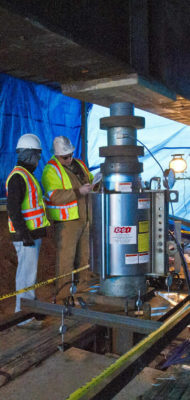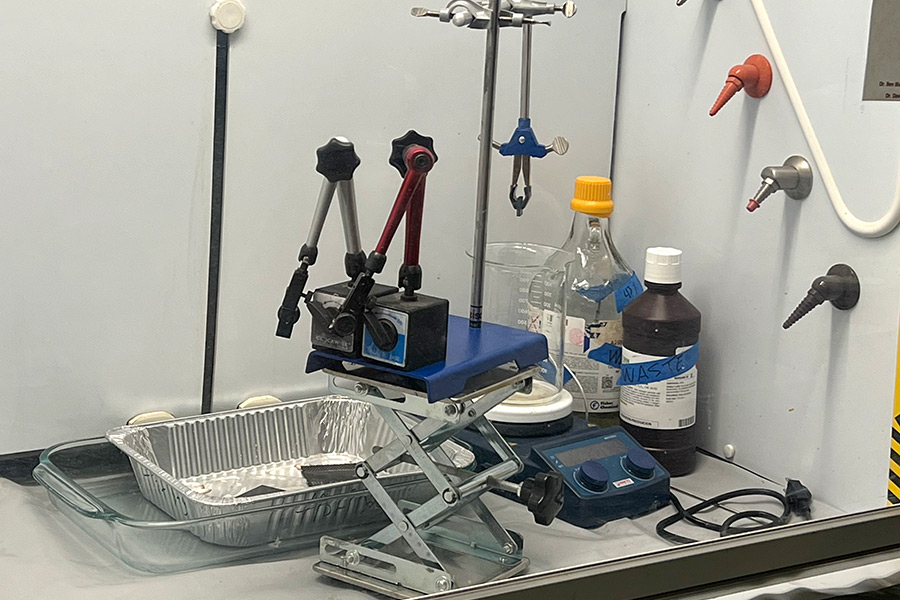Materials Test Lab Providers: A Extensive Approach to Quality Control
Wiki Article
Accuracy Testing of Products for Strength and Longevity
Precision screening of materials for stamina and longevity plays a crucial duty in numerous sectors, including construction, design, and production. This procedure entails subjecting various products to rigorous assessments to identify their capability to withstand outside pressures and keep their honesty in time.Worldwide of materials testing, precision is paramount. Engineers and researchers count on dependable and accurate information to make informed decisions about material selection, design optimization, and product efficiency. By utilizing innovative testing strategies and modern equipment, professionals can examine the strength and durability of a variety of materials, such as steels, polymers, composites, and ceramics.
This introduction will offer understandings right into the importance of accuracy screening, the sorts of products commonly based on testing, the crucial specifications for toughness evaluation, and the techniques used for sturdiness assessment. It will likewise highlight the applications and benefits of conducting precision screening in different sectors.
Significance of Precision Screening
Precision testing is an essential action in assessing the stamina and sturdiness of products, giving accurate and trusted information for educated decision-making. The quality and efficiency of materials play a critical role in ensuring the security and longevity of structures and products when it comes to manufacturing and construction industries. For that reason, performing accuracy screening is of utmost significance to figure out whether the materials fulfill the required specs and standards.By subjecting products to rigorous screening designers, manufacturers and procedures can analyze their mechanical residential properties, such as tensile stamina, firmness, and effect resistance. This information allows them to make certain that the products can hold up against employed pressures and environmental problems without failing or degradation gradually. Furthermore, precision testing helps determine any type of possible issues or weak points in the materials, making it possible for makers to make essential improvements or alterations to enhance efficiency and integrity.
Additionally, precision screening provides objective and measurable data that can be utilized to contrast different products and make informed choices about their viability for particular applications. This details is particularly valuable when selecting products for critical parts or structures where failure might have extreme effects.
Kinds Of Products Subjected to Evaluating
Numerous materials undergo screening for toughness and resilience. This screening is essential to make sure that the materials can withstand the demands of their designated applications and to identify their anticipated life-span. The sorts of products based on screening are diverse and include metals, polymers, ceramics, composites, and construction products.Metals, such as steel and light weight aluminum, are typically tested for their tensile stamina, solidity, and resistance to corrosion. materials test lab. These examinations help determine their suitability for use in structural applications, machinery, and different commercial processes

Ceramic products, such as porcelain and ceramic tiles, are checked for their compressive stamina, heat resistance, and resilience. These examinations guarantee that ceramics can withstand high temperature levels and harsh environments, making them appropriate for applications in the construction, electric, and aerospace markets.
Compounds, which are materials made from a mix of different components, undergo different examinations to assess their mechanical buildings, such as effect, stiffness, and stamina resistance. Composite materials are widely made use of in industries such as aerospace, vehicle, and sporting activities tools manufacturing.
Building and construction materials, consisting of concrete, asphalt, and wood, go through screening to establish their load-bearing capacity, longevity, and resistance to weathering. These tests are vital in ensuring the security and long life of bridges, structures, and roadways.
Trick Parameters for Strength Assessment
Products based on screening for strength and longevity must be evaluated based upon vital criteria that properly evaluate their read what he said capability to endure environmental conditions and external forces. These specifications play a crucial role in identifying the overall efficiency and integrity of a product. One of the essential specifications for stamina examination is the tensile strength, which determines a material's ability to resist drawing forces without damaging or flawing. An additional vital criterion is the compressive stamina, which assesses a product's resistance to being or squashing squeezed with each other. Furthermore, the flexural stamina is considerable, as it gauges a product's capability to endure flexing or turning forces. Moreover, the influence strength is vital in analyzing a product's resistance to abrupt, dynamic pressures. Other parameters that add to strength assessment include shear strength, fatigue toughness, and firmness. Shear stamina gauges a material's capability to withstand pressures that cause gliding or abusing. Tiredness strength evaluates a product's resistance to duplicated loading and unloading cycles. Solidity is crucial as it gauges a product's resistance to imprint or abrasion. By examining these key specifications, scientists and designers can accurately evaluate the stamina and longevity of materials, enabling them to make enlightened choices in various industries such as aerospace, automotive, construction, and manufacturing.

Methods for Durability Assessment
Resilience evaluation techniques are vital for evaluating the long-term efficiency and dependability of materials. These strategies are important in establishing the capability of products to endure various environmental problems and mechanical tensions over prolonged durations of time.One more strategy is cyclic testing, which includes subjecting products to repeated loading and discharging cycles. This helps evaluate the product's tiredness resistance and its ability to withstand repetitive stress without failure. By evaluating the stress-strain feedback of the product during cyclic screening, scientists can identify potential weak factors and evaluate the material's sturdiness.
Additionally, non-destructive testing techniques such as ultrasonic testing and infrared thermography can be employed to evaluate the internal integrity and spot any type of problems or damages in the material. These methods supply beneficial info regarding the product's durability without causing any type of damage to it.
Applications and Benefits of Precision Screening
Precision screening plays a vital function in examining the stamina and resilience of products, allowing engineers and researchers to get reputable and accurate data for reviewing their performance. The applications of accuracy testing are varied and can be discovered across numerous industries, consisting of aerospace, vehicle, building and construction, and manufacturing.Among the crucial advantages of precision screening is its ability to recognize prospective weak points or problems in products. By subjecting products to extensive and regulated screening, any kind of vulnerabilities or issues can be spotted prior to they cause catastrophic failings. This allows suppliers to make needed improvements or changes to try this web-site enhance the general top quality and resilience of their items.
Accuracy testing also assists in determining the ideal layout and make-up of materials. By checking various variants and configurations, designers can identify the most appropriate products for specific applications. This causes improved efficiency, performance, and cost-effectiveness in different industries.
In addition, precision testing offers useful data for the development and improvement of materials and manufacturing procedures. materials test lab. It enables researchers to acquire a much deeper understanding of product actions under various problems, leading to the growth of brand-new products with boosted sturdiness, stamina, and efficiency characteristics
Conclusion
In verdict, accuracy screening plays a vital function in examining the stamina and sturdiness of materials. By subjecting numerous types of products to extensive screening, vital specifications for stamina analysis can be identified.Precision screening is a vital action in assessing the strength and longevity of materials, giving trustworthy and accurate information for educated decision-making.Various products are subjected to testing for stamina and durability. The types of products subjected to screening are diverse and consist of steels, polymers, porcelains, composites, and building products.
By evaluating the stress-strain feedback of the product during cyclic screening, scientists can recognize potential weak points and assess the product's longevity.
In conclusion, precision testing plays a look these up critical duty in evaluating the strength and sturdiness of materials.
Report this wiki page